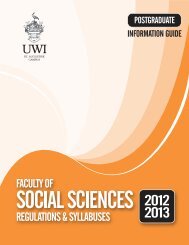Faculty of Humanities and Education (Postgraduate) - The University ...
Faculty of Humanities and Education (Postgraduate) - The University ...
Faculty of Humanities and Education (Postgraduate) - The University ...
You also want an ePaper? Increase the reach of your titles
YUMPU automatically turns print PDFs into web optimized ePapers that Google loves.
106<br />
POSTGRADUATE REGULATIONS & SYLLABUSES 2012 - 2013<br />
THE FACULTY OF HUMANITIES & EDUCATION<br />
YEAR:<br />
SEMESTER:<br />
COURSE CODE: EDRS 6203<br />
COURSE TITLE: GRADUATE RESEARCH SEMINARS<br />
NUMBER OF CREDITS: PASS/FAIL<br />
Each Master student is required to present the proposal for<br />
his/her research project to fellow students <strong>and</strong> academic<br />
staff members at a Graduate Research Seminar. <strong>The</strong> student is<br />
provided with feedback by way <strong>of</strong> questions <strong>and</strong> comments.<br />
<strong>The</strong> intention is to provide a forum in which the student could<br />
articulate his/her plans for research <strong>and</strong> also receive suggestions<br />
<strong>and</strong> comments about such plans.<br />
Students are expected to attend at least 75% <strong>of</strong> the seminars<br />
over the two-year period during which the Master Programme<br />
is <strong>of</strong>fered.<br />
YEAR:<br />
SEMESTER:<br />
COURSE CODE: EDRS 6900<br />
COURSE TITLE: RESEARCH PROJECT<br />
NUMBER OF CREDITS: 10<br />
To be eligible for the award <strong>of</strong> the M Ed, all students will be<br />
required to complete a Research Project. <strong>The</strong> paper is the<br />
culmination <strong>of</strong> the Quantitative <strong>and</strong> Qualitative Research<br />
Methods courses <strong>and</strong> Graduate Research Seminar sequence<br />
(EDRS 6208; EDRS 6210; EDRS 6203).<br />
<strong>The</strong> Research Project will test the ability <strong>of</strong> Programme<br />
participants to:-<br />
• conceptualise a research issue or problem;<br />
• develop a clearly stated, detailed proposal <strong>and</strong> plan <strong>of</strong><br />
procedures <strong>and</strong> techniques through which the research<br />
activity is to be implemented <strong>and</strong><br />
• implement an aspect, some aspects or all aspects <strong>of</strong> the<br />
proposed plan.<br />
In other words, while students may choose to implement the<br />
entire project, they may also decide, in consultation with their<br />
supervisors/advisors, on the in-depth operationalisation <strong>of</strong> one<br />
or more aspects <strong>of</strong> the detailed research plan. For example, the<br />
student may choose to focus on the preparation <strong>of</strong> an extended<br />
or full-blown literature survey <strong>and</strong> theoretical assessment <strong>of</strong><br />
the major <strong>and</strong> significant issues bearing on the central problem<br />
<strong>of</strong> the research. He/she may buttress this with an annotated<br />
bibliography <strong>and</strong> deploy it all as clinching evidence to support<br />
the appropriateness <strong>of</strong> the chosen research design.<br />
All decisions about the final focus <strong>of</strong> the research activity must<br />
be approved by the students’ supervisor/advising committee.<br />
<strong>The</strong> Research Project Report should not exceed 15,000 words.<br />
Presentation Format<br />
<strong>The</strong> following are the core aspects <strong>of</strong> the Research Project.<br />
• Background as setting <strong>and</strong> intellectual ancestry.<br />
• Conceptualisation/Statement <strong>of</strong> the problem.<br />
• Purpose, research questions, <strong>and</strong> expected outcomes.<br />
• Literature review.<br />
• Methodology.<br />
• Data analysis <strong>and</strong> outcomes.<br />
<strong>The</strong> c<strong>and</strong>idate will be required to either conduct research<br />
in respect <strong>of</strong> the research questions OR provide a detailed,<br />
extended literature review in lieu <strong>of</strong> field research.<br />
In respect <strong>of</strong> the option <strong>of</strong> operationalising the research<br />
questions, the format <strong>and</strong> marking scheme will be as follows:-<br />
• Background as (i) setting <strong>and</strong><br />
(ii) intellectual ancestry 10 mks<br />
• Conceptualisation / Statement <strong>of</strong> the problem 10 mks<br />
• Purpose, research questions, <strong>and</strong> expected<br />
outcomes 10 mks<br />
• Literature review 10 mks<br />
• Methodology 20 mks<br />
• Data collection, presentation <strong>of</strong> findings, <strong>and</strong><br />
data analysis 40 mks<br />
• Conclusion 10 mks<br />
In respect <strong>of</strong> the option <strong>of</strong> the extended literature review, the<br />
format <strong>and</strong> marking scheme will be as follows:-<br />
• Background as (i) setting <strong>and</strong><br />
(ii) intellectual ancestry 10 mks<br />
• Conceptualisation / Statement <strong>of</strong> the problem 10 mks<br />
• Purpose, research questions, <strong>and</strong> expected<br />
outcomes 10 mks<br />
• Methodology 20 mks<br />
• Extended literature review 50 mks<br />
• Conclusion 10 mks<br />
Marks allocated add up to 110 <strong>and</strong> will be converted to a<br />
percentage.<br />
<strong>The</strong> research project should be about 65 pages in length<br />
(approximately 15,000 words) <strong>and</strong> students are asked to submit<br />
three [3 copies] hardbound. Deadline date for submission is<br />
June 30 th <strong>of</strong> the academic year.

















